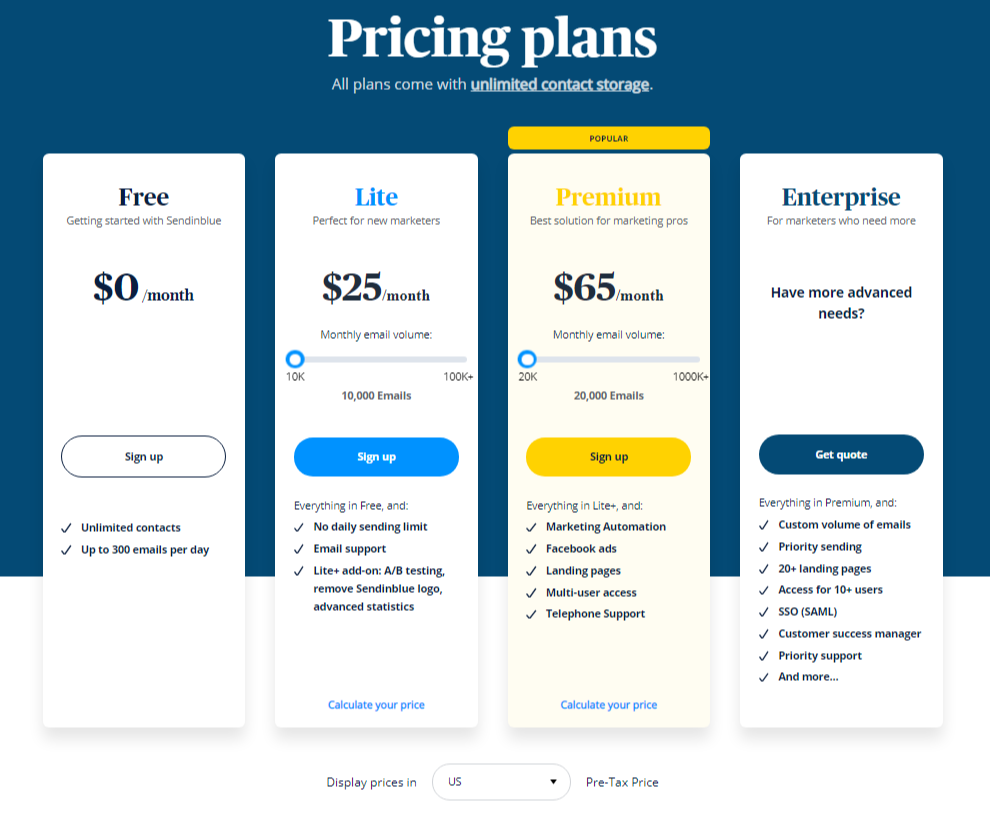The Sendinblue pricing section is effective for several reasons:
1. Clear Hierarchy and Visual Appeal:
- Distinct Tiers: The “Free,” “Lite,” “Premium,” and “Enterprise” tiers are clearly labeled and visually separated with different background colors.
- “POPULAR” Label: The “Premium” tier is highlighted as “POPULAR,” guiding user choice.
- Consistent Layout: Each tier follows a consistent layout with descriptions, pricing, features, and call-to-action buttons.
- Visual Cues: Checkmarks are used to indicate included features, enhancing readability.
- Clear Headings: The headings clearly indicate the purpose and target audience of each tier.
- Pricing Clarity: The monthly prices are prominently displayed.
- Call to Action Buttons: The “Sign Up” and “Get quote” buttons are visually distinct and clearly labeled.
- Informative Headline: “Pricing plans” and “All plans come with unlimited contact storage” clearly state the value proposition.
- Currency and Tax Options: The “Display prices in” and “Pre-Tax Price” options provide transparency and flexibility.
2. Value-Based Differentiation:
- Targeted Descriptions: Each tier has a concise description that clearly identifies the target customer and their needs.
- Feature Progression: The “Everything in [Previous Tier], and:” structure clearly highlights the added value of higher tiers.
- Specific Feature Differentiation: Features like “Marketing Automation,” “Facebook ads,” “Multi-user access,” and “SSO (SAML)” differentiate the higher tiers.
- Quantitative Differentiation: The differences in monthly email volumes provide clear quantitative differences.
- Free Option: The “Free” tier offers a starting point for users with basic needs.
3. Transparent Pricing:
- Clear Pricing Information: The monthly prices are clearly stated for the “Free,” “Lite,” and “Premium” tiers.
- Enterprise Contact: The “Enterprise” tier uses “Get quote,” indicating a tailored solution for larger clients.
- Feature-Based Add-on: The “Lite+ add-on” option provides flexibility for users to add specific features.
4. Addressing Different User Needs:
- Getting Started: The “Free” tier caters to users just getting started with email marketing.
- New Marketers: The “Lite” tier is designed for new marketers needing more features.
- Marketing Pros: The “Premium” tier caters to marketing professionals needing advanced features.
- Advanced Needs: The “Enterprise” tier caters to organizations with advanced needs and complex requirements.
5. Strategic Use of Information:
- Benefit-Oriented Features: Features like “Marketing Automation,” “Facebook ads,” and “SSO (SAML)” highlight the value of each tier.
- Clear Call to Action: The call-to-action buttons provide clear paths for action.
- “POPULAR” Highlight: The “POPULAR” label on the “Premium” tier influences user choice.
- Feature Lists: The feature lists clearly show the differences between the tiers.
- Concise Descriptions: The descriptions are brief and to the point, making it easy to understand the purpose of each tier.
- Price Calculator: The “Calculate your price” links provide a way for users to estimate costs based on their needs.



